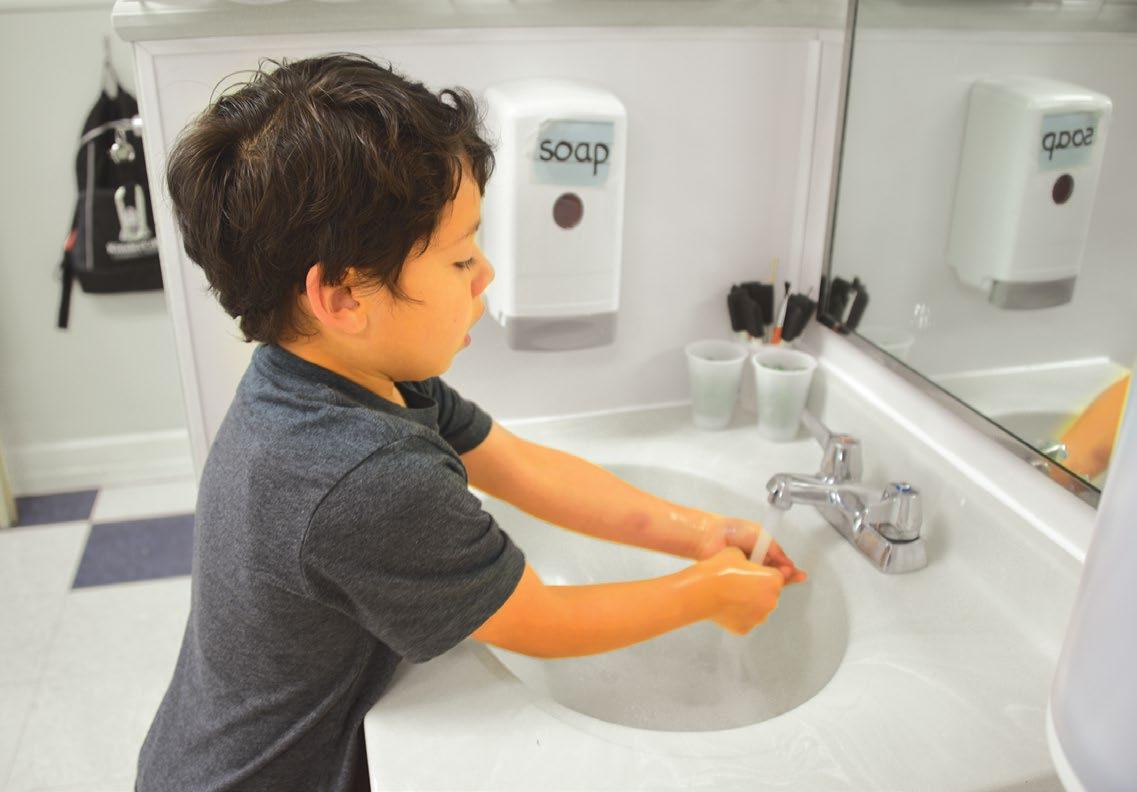
5 minute read
Safe Entertaining Tips in a COVID-10 World
S afe E ntertaining T ips
IN A COVID-19 WORLD
Advertisement
Depending on where you live, restrictions on social gatherings may become less strict in the coming weeks and months. However, many experts caution that care should still be exercised when groups of people gather. After an extended period without social contact, it’s only natural to crave some interaction, and there’s evidence that doing so can be advantageous for your mental health. However, taking precautions to protect your physical health, along with your guests’, can make for a more enjoyable event.
Keep it contained. Limit your gatherings to a few close friends or family members so if someone does get sick, contact tracing is a simple task. Keep in mind the number of same-household families you invite is more important than the number of people in that family. For example, one family of six that has already been living in close quarters poses a lower risk than three couples living in separate houses. Also be mindful of your guests’ approach to prevention; if they’ve been less cautious than your family or vice versa, there’s room for conflict and anxiety.
Celebrate outdoors. Indoor event spaces naturally have less circulation, meaning potential airborne particles hang around longer. Planning your gathering outdoors helps ensure more free-moving fresh air and more space for guests to spread out and practice social distancing.
Encourage guests to bring their own. It may go against all your good hosting inclinations but hosting a bring-your-own party eliminates shared food and the risk of cross-contamination. You can provide
Photo courtesy of Getty Images
disposable table service (plates, silverware and napkins) and single-serve beverages, but skip the cooler everyone reaches into.
Provide ample, well-spaced seating. Encourage guests to keep some distance from one another by creating comfy seating arrangements. You can take it a step farther by asking guests to bring their own chairs and directing each family to set up its space a reasonable distance from the next.
Make cleanliness a priority. Create stations with hand sanitizer or wipes. You can also create a makeshift sink to minimize trips to the restroom indoors. Provide a spray bottle or bucket, soap and paper towels near the hose for quick clean-ups.
Find more advice for navigating pandemic life at eLivingtoday.com.
E motionally P reparing
Your Children for Back-to-School

Between sheltering-in-place, online learning and time away from friends, many children will need a little extra support as they head back to school this fall.
Consider these tips from the experts at KinderCare to help you emotionally prepare your children to return to school with confidence, optimism and excitement.
Address Your Feelings (& Theirs)
Children often take cues about how to react from their parents. Think about what it takes for you to feel calm and prepared (or even excited) for the start of a new school year. That could mean talking with your child’s teacher or school about the safety precautions they’re taking so you can feel more at ease, taking a few minutes to establish a morning routine or stepping away from news that makes you anxious. Focus instead on the positive aspects of school, like the opportunity your child will have to learn, make friends, interact with others and grow into his or her own person. “Children need a sense of belonging, and school provides an important connection point for them,” said Dr. Elanna Yalow, chief

academic officer for KinderCare Learning Centers. “Nothing builds a sense of community like personal contact with friends and teachers. That connection is essential in supporting a child’s growth and development.”
Set Expectations About What to Expect Before the First Day
Some children may feel ready to go and eager to explore, while others can be more reserved or even fearful of new places, faces and routines. When your child knows what to expect, it can go a long way in soothing any worries he or she may have about leaving home and going to school. It’s also important to respect your child’s growing independence and empower him or her to help others. As you explain safety precautions like covering the mouth when sneezing or coughing, or proper hand washing, emphasize how your child’s actions can help keep family, friends and teachers safe.
“Children may already be apprehensive about returning to school, let alone trying to cope with new safety practices,” said Dr. Joelle Simpson, a pediatric emergency medicine physician and medical director for emergency preparedness at Children’s National Hospital. “Explaining these precautions ahead of time can help
S eason

your children see them as part of the school day routine instead of something to fear. For parents, remember that while children can get sick from this virus, it occurs less frequently than in adults and at lower rates than the flu.”
Celebrate the Start of a New School Year
Try to plan a special activity or some extra family time the week before school starts and encourage your child to participate in the planning. “Remember, children didn’t have time for a clean break and celebration at the end of the last school year, and this can help your child mentally adjust to a new routine and schedule,” Yalow said.
Let your child know how proud you are to see him or her growing up, learning how to be a good friend and exploring and learning about the world. Be sure to talk with your child each school day – what was learned, funny things friends said, the things that seem little but are important to your child. For more tips about how to help your child prepare for the new school year, visit kindercare.com. (Family Features)

Let’s Go to Family Camp!











